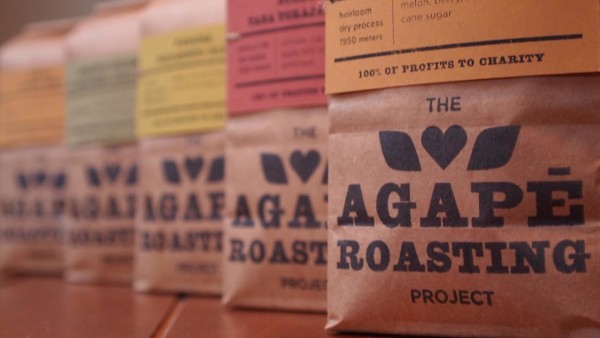Just six years ago, Brad Baltz was dumping powder from hot cocoa packets into his office coffee at his corporate job in Denver, completely unaware of the flavor potential of good coffee.
“We used to hate coffee. I couldn’t drink it,” Baltz says of he and his wife Jen. One day, the couple tried a cup from Denver’s Huckleberry Roasters, and something big that happened in their mouths did something big in their brains. “It blew our minds. From there, I was hooked. We then tried the big San Francisco roasters, and then started to seek out every 3rd wave roaster we could. I had no idea flavors like strawberry, caramel and mint could come naturally in coffee.”
So Baltz bought a starter roaster kit from Sweet Maria’s, eight pounds of green coffee, and as he puts it “fell in love with the never-ending search.” Now, with a 3-pound San Franciscan, Brad and Jen Baltz, have officially launched the Agápē Roasting Project, a micro roastery with about five wholesale accounts, and counting, that donates a portion of its proceeds to local and regional charities. We asked Brad what’s up with the project and what’s going on in Denver. (The answer is a lot.)
What’s in the name, the Agápē Roasting Project?
We wanted a name that would encompass our motivation for doing this. We felt that the greek definition of Agápē was perfect: from the perfect/pure love of coffee, for the greater good, with a reciprocal/contagious/cyclical effect.
What is the biggest challenge you have in roasting?
In short, we typically finish our roasts somewhere between 80 percent of the way through first crack, and well short of second. I think our small, but recent successes have really come from choosing the right greens. For me, that is the hardest, and most stressful part of the process. We just cupped 40-plus coffees trying to find our next offering. I’ve had some awful roasts from average greens, but I’ve only roasted a few undrinkable cups with great beans.
How do you approach each roast?
Our approach to each bean is just to find the most exciting profile possible utilizing our previous successes with specific beans and origins that have worked well. Using density, moisture content, screen size are all huge in determining my ‘hypothesis’ profile. Based on those specifics I chart out a potential time, temp and drop profile, but adjust through the first roast based on my senses. Sometimes halfway through the roast it doesn’t feel like it’s roasting well, so I close my notebook and listen to my senses. I have found that some of my best profiles come from trusting my gut.
It seems like there is a ton of exciting stuff happening in the Denver area right now. Is that true?
Huckleberry, Corvus, Novo and Sweet Bloom are some of the bigger third-wave roasters in town, and they have offered to share pallets so that we can make shipping reasonable, talk profiling, suggest approaches to certain beans, use their space for event and sample-roast together. They have even offered time on their profile roasters so that we can better dial-in our roasts. To me, that’s amazing. I had thought we’d get a cold shoulder and a “figure it out on your own” type of attitude. It has been anything but. I think they all understand that we can be stronger as a community rather than as isolated individuals. We have also learned a lot from some of the smaller, more similar sized roasters in town. Flying Baron Roasters and Moonshot are both on similar size machines as us, and we’ve roasted together, shared profiles, importers, and regularly cup new coffees together. We’ve even referred each other to wholesale opportunities or events, solely to support the community.
We know people in Denver love their craft beer. Is coffee infiltrating that world?
Yes, the craft beer and coffee worlds are colliding. We got a call from the head-brewer at Rock Bottom in Westminster to work on a stout in December…I think they want to explore more options using coffee as an ingredient other than just for the ‘roast flavor.’ Most roasters are working with a craft brewer on some level right now. A brand new brewery called Station 26 is even putting Corvus Coffee’s cold brew on tap at their tasting room this summer. I think that in itself is evidence of the attitude toward collaborating across industries. Epic Brewing in Denver had an event at their space last month specifically to cup 4 of the roasters in Denver alongside 8 of their beers, to showcase how well coffee and beer work together. One of the crowd favorites was a very lightly roasted Huckleberry with a light brown ale. I think we’ll see more and more beers utilizing third wave coffees in beers other than the standard stouts and porters. Maybe even more kolsches, wheats, or saisons?
What’s the latest with the Rocky Mountain Craft Coffee Alliance?
The Rocky Mountain Craft Coffee Alliance is a newish entity in Denver with the specific goal of collaboration and education between roasters, baristas, importers and coffee enthusiasts. Chris Schooley is a part of this, along with about eight or so roasters, a few craft shops and anybody with an interest. The Epic Brewing event was coordinated between RMCCA and the brewery. We’ve had a lot of other events that are bringing strength to third wave coffee in Denver similar to this. We try to have an educational and collaborative event every month. RMCCA has even had events asking home roasters to come out and brew their coffees.
Nick Brown
Nick Brown is the editor of Daily Coffee News by Roast Magazine.
Comment
1 Comment
Comments are closed.







I have a mission at my church called Agape and I am also a coffee lover I can wait to try some of this coffee.